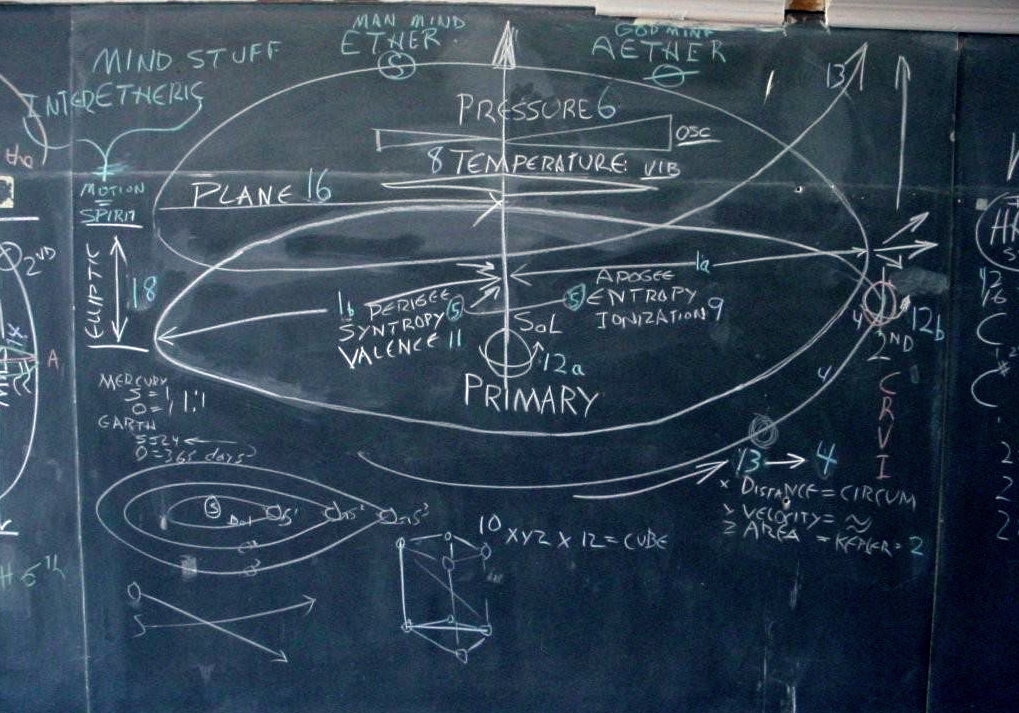The wavefunction provides a complete description of the physical system and its changes and motion over time. This description is usually presented in mathematical values and symbols representing the elements or variables of that system, for instance a sound wave. The variables will include Russell's eighteen dimensions as also a few additional variables reflective of the sound wave's static and dynamic state and changing state over time (motion).
See 12.11 - Eighteen Attributes or Dimensions for a list of these variables that may be included in a mathematical description of a wavefunction.

[NOTE: Remake and replace Otey/Presti video introducing the Russell Wavefunction.]
The above image represents the many elements or variables constituting a sound wave or any other system having a center primary (sun, star, atom) and orbiting secondaries (planets). Each of the elements or variables is numbered with the same numbers as are used in 12.11 - Eighteen Attributes or Dimensions.
The Scale of Locked Potentials can be applied to the eighteen variables, dimensions or components of the state of matter, energy and motion as presented by Russell. [See Part 9 for additional information on these eighteen variables, dimensions or components.] These variables, dimensions or components are the descriptors of matter, force and energy. By varying these variables, dimensions or components matter, force and energy may be modified. Or the reverse can occur as these variables, dimensions or components are changed so is the matter, force and energy manifesting. (A few additional variables, dimensions or components have been added as it is deemed these would be important and/or useful in certain calculations or considerations.) [See Law of Transformation of Forces, Born Oppenheimer approximation, rovibronic coupling, wavefunction]
These variables, dimensions or components of state are a larger set of a thermodynamic state. While standard thermodynamics considers primarily temperature, volume and pressure Russell's variable set of state is more comprehensive and inclusive. It is my opinion Russell (and his readership) would have been better served if he had used the term "variable" or "component" instead of the term "dimension".
These are the variables, dimensions or components which, when known and measured will make man master in that he will be able to evolve, or devolve, or transmute, or synthesize the elements at will:
| Description | ||
| 1st | length (Distance, Radius) | L |
| 2nd | breadth (Area, Square) | Ba |
| 02.1 | Breadth (Area, Circle) | Bc |
| 3rd | Thickness (Volume, Cube) | Tk |
| 03.1 | Thickness (Volume, Sphere) | Tv |
| 4th | Duration or time (revolution period, see #13) | Tr |
| 04.1 | Time (spin period, see #12) | Ts |
| 5th | Sex (polarity) | Sx |
| 6th | Pressure | P |
| 7th | potentials | Po |
| 8th | Temperature | Tp |
| 9th | Ionization (repulsion, disintegration, dissociation) | Io |
| 10th | Crystallization | Cz |
| 11th | Valence (affinity, attraction) | Vl |
| 12th | Axial rotation (planet or particle spin) | Ar |
| 13th | Orbital revolution | Or |
| 14th | Mass (weight) | M |
| 15th | Color | Cr |
| 16th | Plane (above or below plane of ecliptic of primary) | Pn |
| 17th | Tone (sound, musical tones) | Hz |
| 18th | Ecliptic (above or below plane of ecliptic of primary) | Ec |
These variables, dimensions or components are characterized by two outstanding peculiarity common to all of them: an orderly periodicity and Reciprocating Proportionality. Symbols are proposed and may change. ^ The image below is a sketch showing the eighteen variables as functions of waveform.

The 18 dimensions of the Light Unit.
"These are the dimensions which, when known and measured will make man master in that he will be able to evolve, or devolve, or transmute, or synthesize the elements at will." [Walter Russell - The Universal One]
When measurements of tonal positions are made possible and correlated to plane, color, temperature and other dimensions, a higher and more complex chemical analysis than that of to-day will be made possible.
The simple, modern chemical analysis of a grain of wheat will not allow a synthesis which will enable one to produce the same substance. The more complex chemical analysis of all of the dimensions which enter into that grain of wheat will make it possible to reproduce exactly that substance even to the retaining all of its attributes. [Walter Russell - The Universal One]
The first dimension is "length."
The second, "breadth."
The third, "thickness."
The fourth, "duration," or "time."
The fifth, "sex."
The sixth, "pressures."
The seventh, "potentials."
The eighth, "temperature."
The ninth, "ionization."
The tenth, "crystallization."
The eleventh, "valence."
The twelfth, "axial rotation."
The thirteenth, "orbital revolution."
The fourteenth, "mass."
The fifteenth, "color."
The sixteenth, "plane."
The seventeenth, "tone."
The eighteenth, "ecliptic."
See Also
12.01 - Scale of Locked Potentials
12.04 - Locked Potentials and the Square Law
12.11 - Eighteen Attributes or Dimensions
12.11 - Eighteen Attributes or Dimensions
3.22 - Quantum Leap Delta equivalent to Locked Potentials Delta
9.30 - Eighteen Attributes of a Wave
Aliquot
Chart of Locked Potentials
Component
Conjugate Variables
Diagram I - The Eighteen Tones of Keyed Instruments
Dimension
Eighteen Attributes or Dimensions
eighteen tones
Figure 12.04 - Locked Potential Points Relations and Descriptions
Figure 12.10 - Russells Locked Potential Wave
Figure 12.11 - Russells Locked Potential Full Ten Octave Gamut
Figure 9.12 - Scale of Locked Potentials over Time
Harmonic
Law of Transformation of Forces
Locked Potentials and the Square Law
Order
parametric
Part 12 - Russells Locked Potentials
Partial
rovibronic coupling
Russell Wavefunction Equation
Russell Wavefunction
Scale of Locked Potentials
Spectral Component
State
Subdivision
Sympsionics
Table of the Elements comparing Russell to Standard Model
Thermodynamics
Variable
Wave
Wavefunction
See Also
12.11 - Eighteen Attributes or Dimensions
Eighteen Attributes or Dimensions
Russell Wavefunction
Russell Wavefunction Equation
wavefunction
